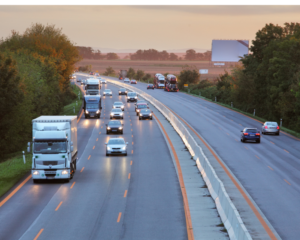Semi-Truck Blind Spot Accident Lawyer in New Jersey

Trucking is vital to the American economy, and since New Jersey is so close to New York City, we see a lot of semi-truck traffic come through our state. In particular, routes like 1-80, 287, I-95, the New Jersey Turnpike, and Route 78 are high-traffic roads that see a lot of truck accidents. Many of these accidents occur because semi-truck drivers fail to make sure their blind spots are clear before turning or changing lanes.
Due to their size and shape, commercial trucks have large areas around the vehicle that truckers cannot see in their mirrors. These blind spots create a risk of a collision if the trucker does not carefully check them before changing lanes. If you or a loved one has been injured because a truck driver failed to check their blind spots, you could be owed money for your medical bills, property damage, lost wages, and more. Get an attorney who will demand what you need by contacting Davis, Saperstein & Salomon, P.C., today for a free initial case review.
Don’t contact an attorney who puts all their funds into billboard advertising. Don’t trust the lawyers who solicit you directly with a police report. Trust the firm that has actual courtroom experience and knows how to get results.
If you’re looking for a trustworthy attorney with a proven record of success fighting for victims of truck accidents, you’ve come to the right place. For over 40 years, our firm has worked tirelessly to advocate for the rights of accident victims in New York City and New Jersey. Our firm has secured more than $1 billion in settlements and verdicts for more than 35,000 families. Our team is fluent in over 11 languages, including Spanish, Russian, Polish, Portuguese, and more, and we can meet you in person or virtually via Zoom, Skype, or FaceTime. Let us help you pursue the financial resources you need to put your life back together after a devastating truck crash. Contact us now to get started.
What Are Blind Spots?
Blind spots refer to the areas around a vehicle that a driver cannot see when looking out the windshield or in their side and rearview mirrors. The location and size of these blind spots are determined by the size and shape of the vehicle and the angle of the mirrors. If a driver does not turn their body to check these blind spots before changing lanes, they risks colliding with an adjacent vehicle they did not know was there. Today, many vehicles have blind spot monitoring technology that warns drivers of vehicles in their blind spot when drivers attempt to turn or change lanes.
Where Are Blind Spots Located on a Truck?
Commercial trucks like 18-wheelers have large blind spots located around the vehicle, including:
- In front: Many trucks have a blind spot that extends several feet in front of the truck due to the driver’s raised seating position and the length of the truck’s engine bay.
- Behind: Commercial trucks have a rear blind spot that extends several dozen feet behind them since they do not have rearview mirrors. The length of the truck means the side view mirrors cannot cover the area directly behind the truck or trailer.
- On the driver’s side: A truck’s blind spot on the driver’s side begins behind the driver’s door and extends much of the length of the truck or trailer.
- On the passenger side: A truck’s passenger side blind spot extends out from the passenger side door at a roughly 45-degree angle into the two adjacent lanes.
At Davis, Saperstein & Salomon, we have over 40 years of experience gathering evidence in truck accidents, proving where negligence occurred, and helping victims recover. This includes showing that a truck driver failed to check a blind spot before changing lanes.
Understanding the No Zones
Trucking industry experts often refer to a commercial truck’s blind spots as “no zones” because other motorists should avoid lingering in these areas. Truck drivers are trained to manage a truck’s blind spots, including tracking when other vehicles enter and exit the truck’s blind spots. However, entering a truck’s “no zone” or lingering in a blind spot creates a risk that a truck driver may not notice your vehicle and attempt to merge into your lane.
Common Causes of Blind Spot Truck Accidents
Many different factors can lead to a blind spot truck accident. The leading causes of crashes include:
- Aggressive or reckless driving, including speeding, weaving between lanes, or tailgating, which can put other vehicles in a truck driver’s blind spots
- Distracted driving, including using a cell phone, eating/drinking, or reaching around the truck cab, which may cause a truck driver to miss seeing a vehicle entering the truck’s blind spot
- Driving under the influence of alcohol or drugs, which can impair a truck driver’s perception and cause them to overlook vehicles entering the truck’s blind spots
- Drowsy/fatigued driving, which can impair a truck driver in the same way as drug or alcohol intoxication
- Driver inexperience, since untrained truck drivers may not know how to manage their vehicle’s blind spots
Who Can Be Held Accountable for a Truck Blind Spot Crash?
Depending on the causes of a truck blind spot crash, several parties may bear responsibility for the accident, such as:
- The truck driver: The truck driver is the person most actively responsible for handling their vehicle. If they are negligent, such as by failing to check mirrors or blind spot monitors or to signal before turning or changing lanes, they could be liable for the crash.
- The trucking company: A trucking company may have vicarious liability for a blind spot truck accident caused by a negligent truck driver employed by the company. Furthermore, a trucking company may bear direct responsibility for a blind spot truck accident due to the company’s negligent hiring or failure to train drivers in managing truck blind spots.
- The truck’s manufacturer: Trucks may have blind spot monitoring technology that warns drivers of vehicles in their blind spots. If these systems have design or manufacturing defects that contribute to a collision, their manufacturer may bear liability.
When handling a truck accident case, our firm investigates the driver, the trucking company, and all potentially liable parties to determine who might be responsible for your damages and losses.
Do I Need a Truck Accident Lawyer?
If you’ve been injured in a truck accident, you deserve the help of an experienced and successful personal injury attorney. A truck accident lawyer can aid your recovery by handing your compensation claims on your behalf, allowing you to focus your time and energy on your medical treatment. While you work on healing, your attorney will stand up to deep-pocketed trucking companies and insurers to demand compensation for your injuries and losses. The team at Davis, Saperstein & Salomon, P.C., can help you get the financial resources you need by:
- Investigating the crash to secure evidence of the truck driver’s or trucking company’s fault
- Identifying liable parties and evaluating avenues for pursuing compensation for you, such as insurance coverage
- Documenting your injuries and losses so that we pursue every cent you will need for your present care and future comfort
- Filing your claims and communicating on your behalf with insurance adjusters, trucking company representatives, and other parties, like your medical providers or bill collectors
- Aggressively pursuing maximum financial recovery for you, whether through a settlement or by taking your case to trial as necessary
Tips to Avoid a Blind Spot Truck Crash
Here are some tips you can follow to stay safe the next time you’re driving around commercial trucks:
- Leave extra room when driving in front of or behind a commercial truck. Large trucks have blind spots that extend several feet in front of and behind the truck.
- Give extra space to an 18-wheeler turning right. Semi-trucks make wide right turns, and the truck cab sometimes must follow a wider path than the trailer. Passing on the inside of a turning truck may put you in the truck’s blind spot and lead to a collision as the truck swings back around.
- Never cut off a truck, as you may end up in the driver’s front blind spot and get hit if they accelerate.
- When driving next to a truck, look at the truck’s side mirrors to check if you can see the truck driver’s face. If you can’t, they likely can’t see you, either.
- Always pass trucks on the left. Passing should always occur in the left lane. A truck driver may not expect a vehicle to pass on their right and may attempt to move to the right lane unawares.
- Avoid lingering in a truck’s blind spot. If you need to pass a commercial truck, do so quickly and safely. While the truck driver might see you enter their blind spot, they might forget you’re there if you stay there for too long.
Damages Available in a Truck Accident Claim
If you’ve been injured in a truck accident that wasn’t your fault, you can file a truck accident claim to demand compensation for what you’ve suffered. A truck accident lawyer from Davis, Saperstein & Salomon, P.C., will fight to recover the money you need for:
- Vehicle repair expenses or reimbursement for your car’s value if it was totaled
- Medical treatment and rehabilitation, including hospitalization, surgeries, pain management, or physical/occupational therapy
- Long-term disability care, including home health services, housekeeping, or childcare assistance
- Lost wages/income from missed work or reduced earnings if you have to go on modified duty due to medical restrictions
- Lost future earning capacity after becoming disabled from your job or other work
- Pain and suffering
- Reduced enjoyment or quality of life due to permanent disabilities or disfigurement/scarring
Our firm has recovered many multi-million dollar verdicts and settlements on behalf of truck accident victims, including a $5 million settlement in a fatal truck accident case.
Statute of Limitations to Take Legal Action
Under New Jersey’s statute of limitations, you typically have two years from the date of a truck accident to file a lawsuit. If you attempt to file after this deadline, the court may throw out your case, and you may lose your opportunity to seek financial compensation. Don’t risk this happening. Instead, protect your legal options by consulting a truck accident attorney from Davis, Saperstein & Salomon, P.C., as soon as possible.
Contact Our New Jersey Truck Accident Attorneys for Help
Were you hurt in a blind spot truck accident in New Jersey? You could be owed compensation for your suffering and losses. Contact Davis, Saperstein & Salomon, P.C. today for a free, no-obligation consultation with a truck accident lawyer to discuss your legal options for demanding fair compensation.











